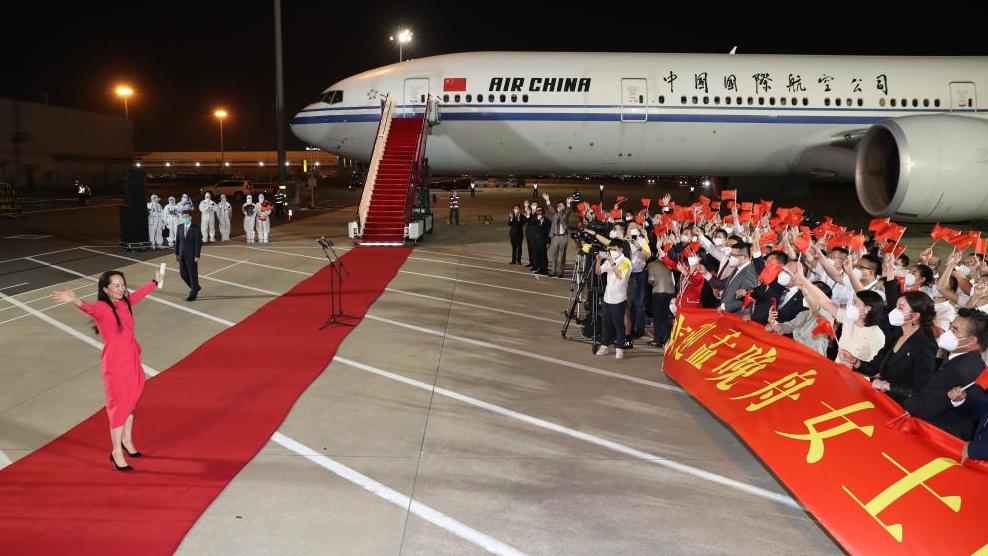
Meng Wanzhou, Huawei's chief financial officer, arrives at Bao'an International Airport in the southern Chinese city of Shenzhen, Guangdong Province, China, September 25, 2021. [Photo/Xinhua]
By Allawi Ssemanda
After spending almost three years under house arrest in Canada, Huawei Technologies Chief Financial Officer Meng Wanzhou and her legal representatives reached an agreement with the U.S. Justice Department that allowed her to return home and leave the dungeon of psychological isolation endured during her house arrest.
Before she gained her freedom, Meng appeared in a court of Brooklyn via video link and pleaded not guilty to bank and wire fraud cases she was being accused of with claims that she tricked Hong Kong based HSBC bank which saw her Huawei transactions cleared by the bank which the U.S. Justice Department claims violated "global financial institutions" and Washington's sanctions against Iran.
Canadian officials had arrested Meng in Vancouver, Canada in December 2018 at the request of U.S. officials who later requested that Meng be extradited to the U.S. to face the charges.
Going forward, it is important to note that whatever reason Washington advances for Meng's arrest and extradition request, the arrest was political and against international laws. While the Justice Department alleges that Meng bypassed Washington's sanctions against Iran by concealing the relationship with a Huawei's subsidiary firm in Iran, such claims lack international laws backing.
First of all, Meng was dealing with HSBC about a business deal with Huawei and its subsidiary in Iran. Though it is true that the U.S. imposed secondary sanctions on companies dealing with Iran, it is also a fact that these are unilateral sanctions and are not based on international laws and cannot be equated with United Nations sanctions that all countries must observe.
Put differently, the above clearly shows that U.S.'s request to Canada to arrest Meng for having business deals conducted in Hong Kong-based bank is driven by U.S.'s libido dominandi – the urge to dominate the world and behavior of intimidating and bullying other countries to accept and stop business deals that have no direct connection with Washington.
The other reason that cannot be swept under the carpet is that Meng was just a victim of former U.S. President Donald Trump's political manoeuvre and his botched trade war against China. Trump is remembered to have launched what some analysts described as poorly thought decisions against China and consistently targeted Chinese firms including Huawei and also announced high trade tariffs against Chinese products in an effort many saw as trying to force Beijing into signing what Trump called fair trade agreements.
Indeed, before the arrest of Meng in December of 2018, Trump unveiled plans for a series of tariffs on Chinese imports. Several analysts interpreted this as a tactic to force Beijing into concession which did not occur. And the arrest of Meng is viewed as Washington's attempts to use her as a pawn in U.S.-China trade negotiations which also arguably failed.
It is also important to recall that even before her arrest, Washington banned the use of Huawei products in government offices and lobbied allies to do the same giving security concerns as the reason for the measure. However, if deeply analyzed, one can conclude that the U.S.'s concerns were not surrounding security but rather its firms' failure to match Chinese firms' technology advancement.
According to a study by Carnegie Endowment for International Peace, the world's third most influential think tank, the U.S. is simply worried of Chinese tech firms like Huawei because of the company's heavy investments in technology and research: "The United States watched warily as China's economic heft has grown and as the technological sophistication of its manufacturing base has increased." Today, Huawei has more contracts in the global north, a development that threatens U.S. market.
The Carnegie Endowment for International Peace paper further contends that, other than China, currently no single country can outsmart or even outcompete Chinese firms in technological innovations.
Therefore, one can conclude that Meng was arrested not for reasons Washington and Ottawa advanced, but she was a victim of political calculations and U.S.'s desire to suffocate competing tech firms. On a lighter note, whatever the motive of Meng's arrest was, her arrest in one way or the other was a blessing in disguise.
It tested Huawei's resilience and the unity of not just the Chinese people but different voices from all over the world. From the humble gesture of a college student who took a bouquet of flowers to Chinese Foreign Ministry to thank the Chinese government's efforts in ensuring Meng's freedom to collection of almost 15 million signatures from all over the world that petitioned Canada to release Meng, the arrest of Meng is a testimony that when you're innocent, the world will always stand with you.
The author is the executive director of Ugandan-based foreign policy think tank Development Watch Center and author of "Why Africa Deserves a Permanent Seat on United Nations Security Council".

 中文
中文





